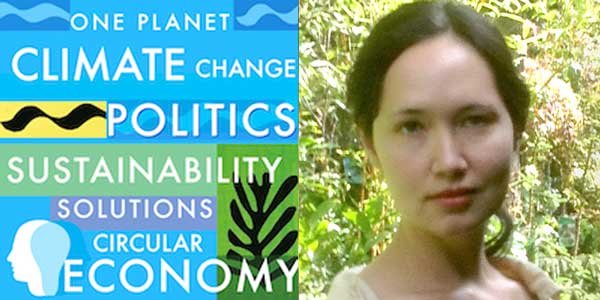What is regenerative business? How can we create a business mindset that addresses social, economic and environmental issues?
Esha Chhabra has written for national and international publications over the last 15 years, focusing on global development, the environment, and the intersection of business and impact. Her work has been featured in The New York Times, The Economist, The Guardian, and other publications. She is the author of Working to Restore: Harnessing the Power of Business to Heal the Earth.
THE CREATIVE PROCESS · ONE PLANET PODCAST
What is regenerative business and how do we see through the greenwashing and manipulation of the certification process and carbon credits that go on to ensure that there is true impact, regeneration, and sustainability hardwired into corporations and businesses?
ESHA CHHABRA
There's a lot of greenwashing that's going on these days. It is great marketing. And that was really the reason why I wrote this book. I had started to see the patterns. You can start to tell them the companies that are genuinely doing it versus the companies that are just talking about it. So that was one indicator, you know, a company that would send out a press release about their goals and what they anticipated to do in the next 5 to 10 years was very different from companies who had said, you know what, this is what we've achieved.
Regenerative Business
Regenerative started coming into the lexicon, the term in 2017, 2018. And regenerative means to regenerate, means to bring life into something. To sustain means to keep the status quo. And regenerative looks at things from a very holistic lens. You know, it's like if you're going to run a regenerative farm, it's all the different components of the farm and the ecosystem ideally come within the ecosystem.
THE CREATIVE PROCESS · ONE PLANET PODCAST
Can you share some of those examples of companies that have adopted the circular economy?
CHHABRA
The circular economy is a really interesting space because the reality is that these waste streams are an opportunity for these companies to rethink how they can build a product out of it.
Toast Ale is this company that was started by a food activist and a social entrepreneur, two folks. And they really felt like, okay, there's this real need to create a product with this waste. So in the UK, a lot of people love to grab a ready-to-eat sandwich that you can get at a Pret A Manger or one of these kind of corner sandwich shops. And the factories that were making the sandwiches, they had to get rid of the end slices on the loaves because nobody wants those kind of fat slices at the end. And you would think that's nothing. It's like two pieces of bread, right? But then you multiply that by thousands of loaves and all of a sudden you have this huge waste. Toast Alse said, "Well, let's make beer out of it."
Alaya Tea
At the end of 2019, I started a tea company. It's called Alaya Tea. We do loose leaf organic tea, and we source as regeneratively as possible, but the packaging was a real headache. We didn't want to do glass because it's too difficult to ship. Aluminum has its own challenges, and the other option is plastic stand up pouches, and you can get a lot of them that are made out of recycled plastics. But we decided to go down the compostable route. Now, even compostable is not a hundred percent solution at the moment. The supply chain of compostables is also very complex. And there's some good compostables, and there's some not so good compostables. And it was a real experience to see what it's like for businesses when they're trying to figure out these solutions. You start to empathize and you really start to understand that this is not easy stuff to figure out because, yes, the materials can exist out there. And yes, there are innovations happening with seaweed and mushrooms and all these other things, but does it work for a business?
Single-use Plastics
Do we need to move away from single-use plastic? Absolutely. There's no need for it. Paper has its cons, but at the same time, the recycling rate on paper is better than plastic. So you have to look at the pros and cons of every single one of these and then see what works for your business and your situation.
THE CREATIVE PROCESS · ONE PLANET PODCAST
As you think about the future, education, and the kind of world we're leaving for the next generation, what would you like young people to know, preserve, and remember?
CHHABRA
I'm inspired by a lot of young people who are in their early twenties. They're very interested in these topics. They love thrifting because it is trendy, cool, and affordable. And it's also really good for the environment. I hope that they continue to fight for what is right. I think that what's needed in today's world is that we do create more equitable models, whether it's in business or elsewhere. And that we do have some kind of respect for the planet because the reality is, if we don't, we're the ones that are going to suffer at the end of the day. It's only going to become harder for us, whether it's getting food to eat, whether it's having an environment that's comfortable and hospitable, whether it's having the supply chains we need for all the products in the world.
I hope that there is a business model and a path forward, and I hope they're the trailblazers who sort of make it happen. We need to encourage that. We need to create policies that also allow for some of this stuff to flourish.















































































